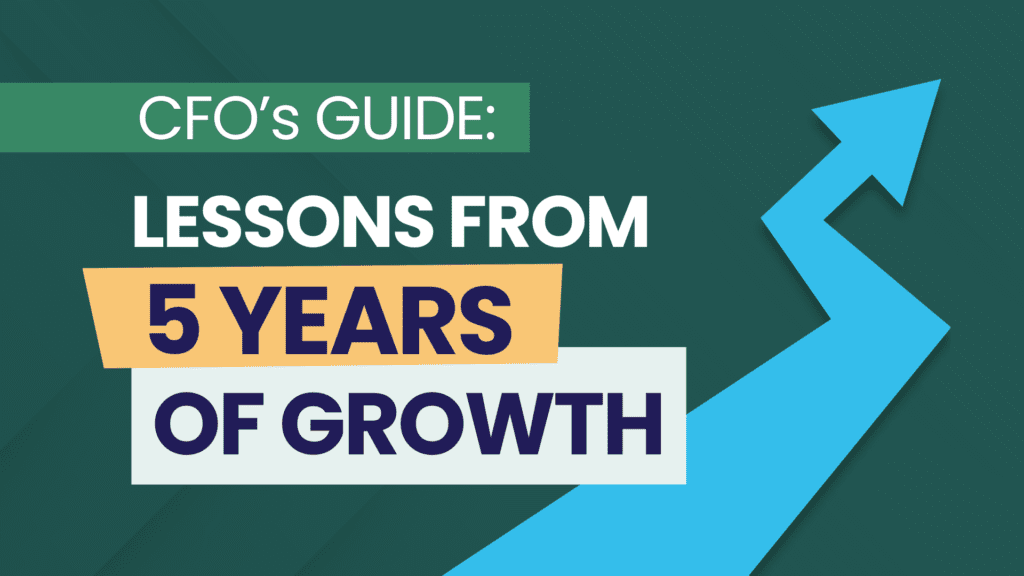How to Be a Successful Finance Leader: Interview with Joanne McCourt, CFO of Ebit

Hi Joanne, it is great to talk to you today. Please can you tell us a bit about your background?
Hi everyone! I completed my ACCA qualifications whilst working full-time in the finance team at New Look. I studied in my own time to achieve my goals, which proved to people that I am committed and can cope under pressure. In 2017, I joined a high growth procurement consultancy called Ebit as their Head of Finance and Operations, and was then very proud to be promoted to CFO last year, and Director within the last month.
Congratulations on your amazing career progression, that is very inspiring. What were your biggest challenges when stepping up in the CFO role?
Stepping up comes with a great deal more responsibility for the business, the role is quite widespread as I now have a number of functions that I am responsible for – obviously the Finance department but also Consultancy and HR.
As a result of now being responsible for Consultancy, I am more client focussed, liaising directly with the CEOs and CFOs of our larger corporate clients. This has many benefits as I’m more in touch with how all parts of the business operates, and not just what the numbers are telling me. I think this is essential for any leader moving the focus from a day-to-day finance role to creating financial and operational strategies that improve profitability, cash flow whilst driving overall company growth and valuation.
I’m embracing technology now more than ever, from how we work internally as a business to how we can support our clients with procurement technology – being able to very quickly access your supply base details, contracts and to identify risk has never been more important.
In your experience, what are the main differences between the Financial Controller and CFO roles, and which skills are most important to focus on for people who wish to become a future CFO?
Becoming a leader is key. To get to this level you have probably demonstrated leadership already, but having the full responsibility to go with it is a step change that you need to get comfortable with.
You need to have the long term in mind to ensure what you and your teams are doing today is steering the business in the right direction.
KPIs – ensuring you are focusing on the right value drivers and trends, moving away from just ensuring that reporting is accurate. You need to understand what’s underlying the financial results.
Embrace technology – as you step into a broader role it’s important for yourself and the business to understand how technology is changing and impacting operations and balancing security, control and cost in this area is key.
Pull away from the detail. I truly believe that you are only as good as the team around you, so ensuring you have the right team that you can trust to focus on the detail. This has given me the space to transition into a leadership role.
Build relationships. I’ve never been a huge fan of business networking, but I’ve put myself out there, made contact with the ‘Big Four’ accounting firms, had a lot of interaction with the PE industry, and attended many networking events that are focused on my peer groups across an array of industries. It’s great to have these contacts, from being there to provide advice to putting you in touch with the right people, many of these relationships have presented business opportunities as well as offered personal development.
What would you say makes a good CFO and what are the best things that finance leaders can do to impress people?
All of the above. Being great at what you do, being able to make tough decisions, and being confident in what you are doing, whilst always demonstrating the right values.
Having a deep understanding of the business, as well as overseeing the capital structure, determining the best mix of debt, and equity internal financing. This was an early challenge for me and one that has definitely paid off.
Running a successful business is impressive, but also being able to pull a business through tougher times is equally impressive – something most CFOs and Directors will have faced more than ever in recent weeks.
Did you have any good role models to help you?
I have had many role models throughout my life, not just my career. Not officially, but just people I have admired and looked up to. I have always asked a LOT of questions (at times to people’s annoyance), from the beginning as an admin assistant/accounts assistant I haven’t wanted to just complete a task, I wanted to understand why it needed to be done this way and what it contributed to.
Early on this was seen as ‘questioning’ people and it was often fed back to me as a weakness and something I needed to improve on, however I just felt misunderstood, perhaps I was just nosey! But this early desire to know and understand as much as possible has certainly helped me get to where I am today.
I think there are role models all over the place, you just have to seek them out, whether that’s officially asking someone to mentor you or watching them from a distance. Find the people that inspire you and get you excited, the ones who make you believe that what you want is possible and that nothing is out of reach if you want it and work hard enough. Also don’t discriminate. I’d look to men, women, people older, people younger, people doing something completely different, but that may have the qualities and values you strive to have. I like to observe different perspectives.
What are the most important things that you look for in a potential employer?
This has changed throughout my career, from wanting security, a solid company to also wanting to lead a company to improve and grow. I’ve never relied upon my manager to get me to where I need to be, so it’s less about the individual employing me and more about the company and the industry. It’s always a bonus if the industry is fast-paced, challenging and fun!
Any final tips for our members?
My main tip and something I’m more focused on these days is being better, not compared to anyone else, but just always striving to improve on my own current baseline. It goes without saying that you need to keep your skills and knowledge up to date, but I think a bigger focus should be given to improving your own mindset and confidence and squashing that self-doubt which can be so limiting.
Another tip and something I’m still trying to drum into myself is that you generally can’t change other people or their opinions and reactions towards you. The only thing you can truly control is your own reactions and thoughts in response to them. If you allow someone’s attitude or opinion of you to impact how you feel, impact your confidence or impact if you decide to apply for that promotion or not, then that’s generally the issue and the thing you CAN change.







Responses